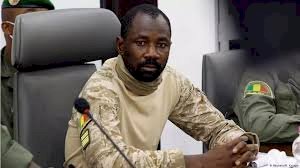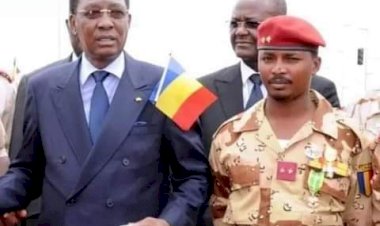In Mali, the ruling junta commits to an eighteen-month transition

To stay up to date on African news, subscribe to the “Africa World” newsletter from this link. Every Saturday at 6 am, find a week of current events and debates treated by the editorial staff of “World Africa”.
Colonel Assimi Goïta (right), president of the National Committee for the Salvation of the People (CNSP), September 6 in Kati (Mali). MATTHIEU ROSIER / REUTERS
The Malian junta pledged on Saturday, September 12, to institute a government to restore civil power in the country within eighteen months. Experts appointed by the junta adopted a transitional “charter” after three days of discussions in Bamako between political figures, civil society and the military.
This “charter” was not published immediately, but the document under discussion on Saturday provided for an eighteen-month transition, led by a president appointed by a committee established by the junta, according to correspondents of the ‘Agence France-Presse (AFP).
“We make the commitment before you to spare no effort in the implementation of all of these resolutions in the exclusive interest of the Malian people”, declared the head of the junta, Colonel Assimi Goïta, in conclusion. “days of national consultation”.
“We ask and hope for the understanding, support and accompaniment of the international community in this diligent and correct implementation of the charter and the roadmap of the transition,” he added.
Read also Mali: ex-President Keïta authorized to leave the country for treatment in the Emirates
A meeting planned with ECOWAS
On August 18, a group of colonels overthrew President Ibrahim Boubacar Keïta, in power since 2013 and weakened by months of protest in the face of the serious security, economic and institutional crisis the country is facing, but also the corruption blamed on the whole class. Politics.
Some of Mali’s international partners, starting with the Economic Community of West African States (ECOWAS), are calling for the return of civilians in a year or less, after a civilian-led transition. ECOWAS, which imposed an embargo on trade and financial flows on Mali, gave the junta until Tuesday to appoint a civilian president and prime minister.
France, Mali’s main ally against the jihadists with more than 5,000 troops deployed in the Sahel, is also pushing to move quickly on the path to a return to civilian rule.
Junta officials are expected to meet with ECOWAS heads of state and government who will meet in Ghana’s capital Accra on Tuesday, an aide to former Nigerian President Goodluck Jonathan told AFP. mediated for a long time in this crisis.
“The results you have achieved allow me to hope for the advent of a new, democratic, secular, prosperous Mali, founded on work, social justice and equality”, declared the head of the junta to the participants. .
Article reserved for our subscribers Read also After the coup d’état in Mali, France fears a further deterioration of security in the region
A completely “butchered” document
But beforehand, several participants, in particular members of the protest movement which mobilized for weeks in the street against the regime of President Keïta, denounced a “confiscation” of power by the military.
One of the leaders of the movement, Sy Kadiatou Sow, former governor of Bamako and ex-minister, thus protested against a “document which has been completely butchered” in relation to the work carried out since Thursday.
“We will not approve this charter” as it stands, assured Sy Kadiatou Sow, deploring “a desire to confiscate power by the CNSP [National Committee for the Salvation of the People established by the putschists] and those who support it” .
Advocates of a long transition to the military argue that the time and authority it takes to turn a country back on the brink of collapse. The others, on the contrary, cite the risk of further instability in a Sahel already affected by jihadist groups, and the bad regional example set by a junta held in power for a long time.
Read also Mali: who are the putschists of the National Committee for the Salvation of the People?
The World with AFP


















































